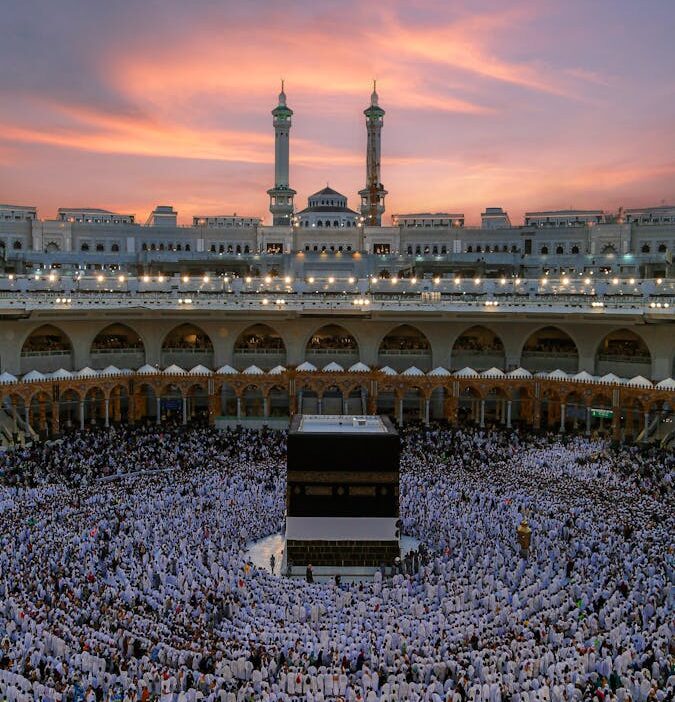Introduction
In this part we examine the early life of ‘Umar al-Khattab, his Islam, and his migration.
Birth and description
‘Umar was born thirteen years after the Year of the Elephant. With regard to his physical characteristics, he was white with a reddish complexion, with handsome cheeks, nose and eyes, and large hands and feet. ‘Umar was muscular and taller than average, as if he was riding on a mount. He was very strong. ‘Umar was a fast walker, he spoke clearly, and when he struck, he caused pain. His father was al-Khattab ibn Nufayl. ‘Umar’s grandfather Nufayl ibn ‘Abdul-‘Uzza was one of those to whom Quraysh used to refer for judgement.
His life during the jahiliyah
‘Umar spent half of his life in the Jahiliyah, and grew up like his peers of Quraysh. However had an advantage over them in that he was one of those who had learned to read. His father al-Khattab forced him to tend his camels and treated him very harshly. ‘ Abdur-Rahman ibn Hatib mentioned: “I was with ‘Umar ibn al-Khattab in Dajnan and he said, ‘I used to tend (livestock) for al-Khattab in this place, and he was very harsh. Sometimes I would tend (the livestock) and sometimes I would gather firewood.’ ”
Sa‘d ibn al-Musayyab narrated: “ ‘Umar went for Hajj, and when he was in Dajnan he said, ‘There is no god but Allah, the Most High, the Most Great, the One Who gives whatever He wills to whomever He wills. I used to tend the camels of al-Khattab in this valley, wearing a woollen garment. He was harsh, would exhaust me when I worked and beat me if I fell short. And now here I am, with no one between me and Allah.’”
His Islam
The Prophet (salalahu alaihi wa sallam) said: O Allah strengthen Islam with the Islam of either of the two that are dearer to you. (Aḥmad)
Report 1
The first ray of the light of faith that touched his heart came on the day when he saw the women of Quraysh leaving their homeland, What caused them to leave was the persecution that they were facing from him and others. His conscience was stirred and he felt remorse and pity for them. He spoke kind words to them which they had never expected to hear from him. Umm ‘Abdullah bint Hantamah said: “When we were travelling, migrating to Abyssinia, ‘Umar, who used to persecute us mercilessly, came and said to me, ‘Are you leaving. O’ Umm ‘Abdullah?’ I said, ‘Yes, you have persecuted us and oppressed us. And by Allah we are going out in the land of Allah until Allah grants us a way out.’ ‘Umar said, ‘May Allah be with you.’ And I saw kindness in him that I had never seen before. When ‘Amir ibn Rabee‘ah, who had gone out on some errand, came, I told him about that. He asked, ‘It seems that you hope ‘Umar will become Muslim?’ I said, ‘Yes.’ He said, ‘He will not become Muslim until al-Khattab’s donkey becomes Muslim !”’
Report 2
Musnad Ahmad contains a tradition from ‘Umar, saying: Before embracing Islam one day I came out of my house with a view of causing trouble to the Holy Prophet , but he had entered the Masjid al-Haram before me. When I arrived, I found that he was reciting Surah Al-Haaqqah in the prayer. I stood behind him and listened. As he recited the Qur’an, I wondered at its literary charm and beauty. Then suddenly an idea came to my mind that he must be a poet as the Quraish alleged. Just at that moment he recited the words: “This is the Word of an honourable Messenger: it is not the word of a poet.” I said to myself: Then, he must be a soothsayer, if not a poet. Thereupon be recited the words: “Nor is it the word of a soothsayer: little it is that you reflect. It is a Revelation from the Lord and Sustainer of the worlds.” On hearing this, Islam entered deep into my heart.
‘Umar migrates to Madina
His departure
The story of migration is narrated by ‘Umar himself. He said; “When we decided to migrate we — ‘Ayyash ibn Abi Rabee‘ah, Hisham ibn al-‘As ibn Wa’il as-Sahmi, and agreed to meet at a stand of trees in an area called Ada’at Bani Ghi far above the valley of Sarif. We said, ‘If one of us does not make it there, it means that something has prevented him, and his two companions should carry on.’ ‘Ayyash ibn Abi Rabee‘ah and I met at the stand of trees, but Hisham was not able to join us. He was put to trial and succumbed.
His Companion ‘Ayyash is tricked into returning to Makkah
Umar continues:
When we reached Madeenah, we stayed among Banu ‘Amr ibn ‘Awf in Quba’. Abu Jahl ibn Hisham and al-Harith ibn Hisham came to see ‘Ayyash ibn Abi Rabee‘ah, who was their paternal cousin and their half-brother through their mother. They came to us in Madeenah when the Messenger of Allah was still in Makkah. They spoke to us and said, ‘Your mother has vowed that no comb will touch her head until she sees you, and she will not seek shade from the sun until she sees you. ’ He felt sorry for her, but I said to him, ‘O’ ‘Ayyash, by Allah, all the people want to do is to lead you astray from your religion, so beware of them. By Allah, if lice bother your mother she will comb her hair, and if the heat of Makkah becomes unbearable for her she will seek shade.’ He said, ‘I would rather respect the oath of my mother, and I have some wealth there which I am going to take.’
I said, ‘By Allah, you know that I am one of the wealthiest men of Quraysh. I will give you half of my wealth, just do not go with them.’ But he insisted on going with them, and when he insisted I said, ‘If you insist on doing that, then take this she- camel of mine, for she is well-trained and easy to ride. Stay on her back, and if you suspect that they are up to something, you can flee on her.’ So he went out with them, riding that camel. Then when they had travelled partway, Abu Jahl said to him, ‘O’ my brother, by Allah, I feel uncomfortable on this camel of mine; may I ride behind you on your camel?’ He said, ‘Yes.’ So they both made their camels kneel down, so that he could climb up behind him , but when they were both on the ground, they pounced on him and tied him up, then they took him to Makkah where they put him to trial, and he succumbed.
Allah reveals a tremendous verse
We used to say that Allah would not accept any good deed or repentance from one who succumbed one who had come to know Allah then went back to kufr because of some trial that befell him. And they used to say that to themselves too. When the Messenger of Allah came to Madeenah, Allah revealed these words concerning them:
Say, ‘O’ Ibadi who have transgressed against themselves! Despair not of the Mercy of Allah, verily, Allah forgives all sins. Truly, He is Oft- Forgiving, Most Merciful. And turn in repentance and in obedience with true Faith to your Lord and submit to Him before the torment comes upon you, [and] then you will not be helped. And follow the best of that which is sent down to you from your Lord before the torment comes on you suddenly while you perceive not!' 39: 53-55.
‘Umar sends the verses to his friends in Makkah
‘Umar ibn al-Khattab said: “I wrote these words down on a piece of paper and sent them to ‘Ayyash ibn Abi Rabee‘ah and Hisham ibn al-‘As.” Hisham said: “When it reached me, I sat down and read it in Dhu Tuwa (one of the valleys of Makkah), reading it over and over, but I did not understand it until I said, ‘O’ Allah, make me understand it.’ Then Allah caused me to understand that it had been revealed concerning us and what we used to say about ourselves and what others said about us. I went back to my camel and sat on it, and went to join the Messenger of Allah in Madeenah.”
The far-sightedness of ‘Umar
This story demonstrates to us the high degree of brotherhood that had been established by Islam. ‘Umar was willing to sacrifice half of his wealth for the sake of his brother’s safety, because he feared that he would be persecuted by the mushrikeen after he went back to Makkah. But ‘Ayyash was overwhelmed by his feelings for his mother and his desire to honour her. That’s why he decided to go back to Makkah and honour his mother’s oath, and bring the wealth that he had left there. And his self respect would not allow him to take half the wealth of ‘Umar when he had his own wealth in Makkah. But ‘Umar was more far-sighted. It is as if he could see the misfortune that would befall ‘Ayyash if he went back to Makkah. When he was unable to convince him, he gave his his well- trained camel. And the betrayal of the mushrikeen which was expected by ‘Umar did indeed befall ‘Ayyash.
Key lesson from the story of Umar’s migration
The idea had become widespread among the Muslims that Allah would not accept any good deeds from those who were put to trial and succumbed, and remained living in the jahili society. Then Allah revealed the words: Say, ‘O’ My slave] who have transgressed against themselves Despair not of the Mercy of Allah. No sooner had these words been revealed but ‘Umar hastened to write them down and send them to his two dear brothers, ‘Ayyash and Hisham, so that they would try again to escape the camp of kufr. What a sublime attitude the son of al-Khattab displayed. He had tried to persuade his brother ‘Ayyash, offering him half of his wealth to convince him not to leave Madeenah, and he had given him his she- camel so that he might flee on her. Yet despite all that, he did not remind him of what he had said. Nor did he tell him off for going against his opinion and rejecting his advice. On the contrary, his feelings of love and loyalty towards his brother came to the fore. No sooner has this verse been revealed but he hastened to send it to his brothers in Makkah and to all the weak and oppressed in that city, so that they could try again to join the Muslim camp.
In part 2 we will show some instances of the coinciding of ‘Umar’s opinion with the Holy Qur’an.
Notes
This article was primarily based on ‘Umar al-Khaṭṭāb. His life and times by Dr. Ali M. Sallabi




